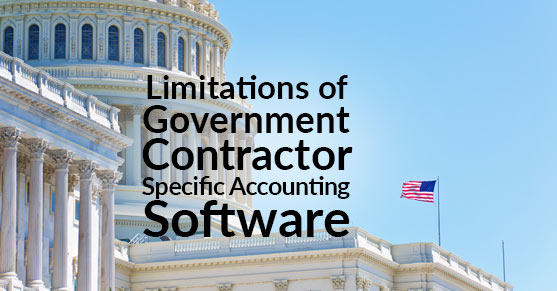SUMMARY:
Government contractors utilizing specialized accounting software often encounter significant operational hurdles regarding customization, integration, and cost, requiring them to proactively manage these systems to maintain compliance.
- Contractors frequently face limited customization options, forcing them to adapt their internal operations to the software’s rigid structure rather than the other way around.
- Integrating specific accounting software with other enterprise tools can be difficult, leading to data discrepancies and increased compliance risks.
- These software solutions often require expensive annual upgrades and lack robust reporting capabilities, necessitating additional tools to gain the business insights needed.
To achieve financial success, government contractors must recognize these inherent software limitations and invest resources to ensure their specific reporting and compliance needs are met.
Table of contents
Government contractors have unique accounting requirements due to the nature of their work. To meet these requirements, many government contractors use specialized accounting software. While these software solutions offer essential functionalities, there are some limitations that contractors need to be aware of.
Lack of Customization
Most Government Contractor Specific Accounting Software offers limited customization options. These solutions are designed to address government-specific accounting requirements rather than contractor-specific ones. As a result, contractors may find that they have to adapt their operations to fit the software instead of the other way around.
Integration Challenges
Government contractors often work with multiple systems, including accounting software, project management software, and other enterprise software tools. Integrating all these systems can be a daunting task, and Government Contractor Specific Accounting Software is no exception. Lack of proper integration can lead to data discrepancies and errors, leading to compliance issues.
Limited Reporting Capabilities
Government Contractor-Specific Accounting Software includes pre-built, government-compliant reports. However, these pre-built reports may not provide contractors with the necessary insights to make informed decisions. Contractors may need to rely on additional tools to prepare custom reports.
Compliance Risks
Government contractors have stringent compliance requirements. Failure to comply with these regulations can result in hefty penalties or even contract termination. While Government Contractor Specific Accounting Software is intended to help contractors stay compliant, the software is not foolproof. Contractors must still invest time and resources in ensuring compliance with applicable regulations.
Expensive Upgrades
Government Contractor Specific Accounting Software can be expensive to purchase and implement. Contractors must often pay for the base software and additional modules, along with ongoing maintenance and support costs. Upgrades can also be costly, with contractors expected to pay for new versions of the software each year, along with the upkeep of the current version.
Conclusion
While Government Contractor Specific Accounting Software offers several essential functions for government contractors, it is not without its limitations. Government contractors must consider these limitations before investing in and implementing such software. Contractors who understand these challenges and work proactively to address them will be better equipped to leverage these solutions for operational and financial success.

